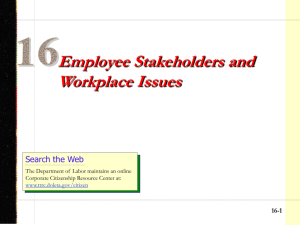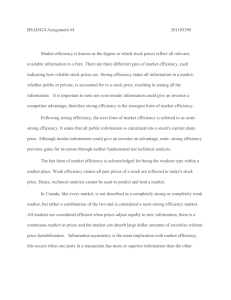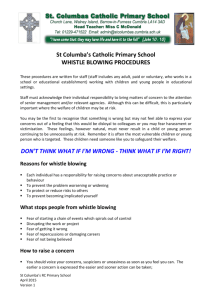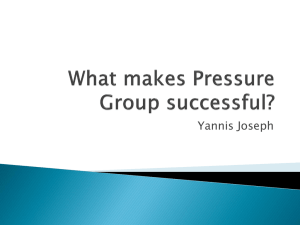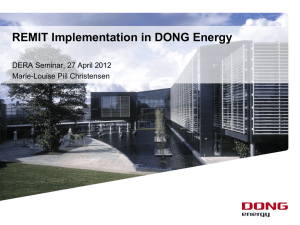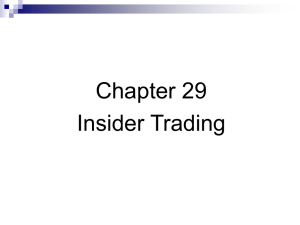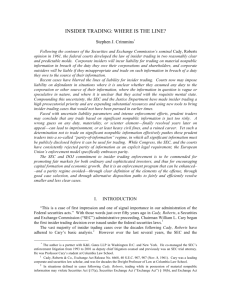Chapter Ten A business fir functions For social benefit To make
advertisement
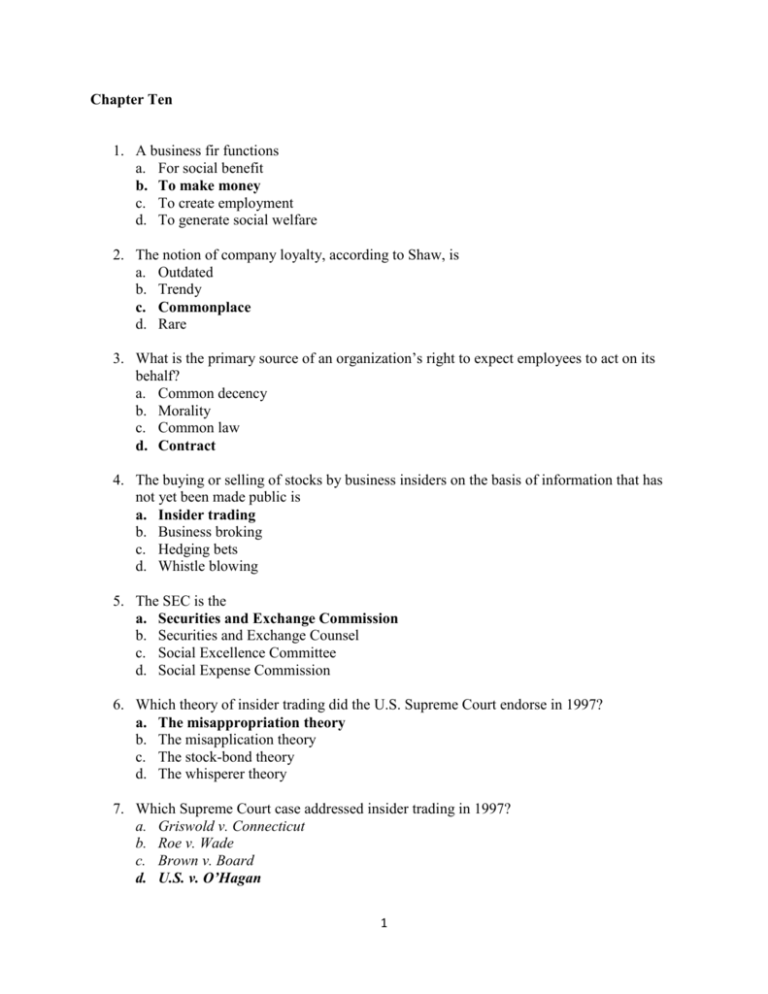
Chapter Ten 1. A business fir functions a. For social benefit b. To make money c. To create employment d. To generate social welfare 2. The notion of company loyalty, according to Shaw, is a. Outdated b. Trendy c. Commonplace d. Rare 3. What is the primary source of an organization’s right to expect employees to act on its behalf? a. Common decency b. Morality c. Common law d. Contract 4. The buying or selling of stocks by business insiders on the basis of information that has not yet been made public is a. Insider trading b. Business broking c. Hedging bets d. Whistle blowing 5. The SEC is the a. Securities and Exchange Commission b. Securities and Exchange Counsel c. Social Excellence Committee d. Social Expense Commission 6. Which theory of insider trading did the U.S. Supreme Court endorse in 1997? a. The misappropriation theory b. The misapplication theory c. The stock-bond theory d. The whisperer theory 7. Which Supreme Court case addressed insider trading in 1997? a. Griswold v. Connecticut b. Roe v. Wade c. Brown v. Board d. U.S. v. O’Hagan 1 8. Henry Manne a. Thinks insider trading is illegal b. Thinks insider trading is immoral c. Sees nothing wrong with insider trading d. Sees insider trading as a violation of trust 9. It is claimed that insider trading is good as it a. Increases market efficiency b. Adds another benefit to employment c. Increases the wealth of insiders d. Decreases company disloyalty 10. Proctor and Gamble once sued three rival food chains for making a. Immoral pickles b. Infringing cookies c. Debatable shortbread d. Actionable cheesecake 11. The Economic Espionage Act was passed in a. 1976 b. 1986 c. 1996 d. 2006 12. There are at least ____ arguments for protecting trade secrets a. 3 b. 4 c. 5 d. 6 13. At one point, the job tenure of an executive in the software industry was a. 17 months b. 19 months c. 22 months d. 26 months 14. Nondisclosure contracts can conflict with a. Freedom of employment b. Freedom of the press c. Freedom of marriage d. Freedom of religion 15. To pay someone to violate his or her official duties is to a. Violate them b. Coerce them 2 c. Bribe them d. Harass them 16. A percentage payment made to a person able to influence or control a source of income is a a. Mule kick b. Whistle blow c. Kickback d. Backdraft 17. The FCPA is the a. Franklin-Calloway Protestors’ Act b. Federal Communications Protection Act c. Foreign Corrupt Practices Act d. Federal Corrupt Persons Act 18. The FCPA was passed in a. 1967 b. 1977 c. 1987 d. 1997 19. The FCPA has exceptions for a. Foreign workers b. Grease payments c. Private payments d. Domestic bribery 20. How many countries have passed legislation implementing the OECD Anti-Bribery Convention? a. 23 b. 33 c. 27 d. 37 21. How many of the world’s industrialized nations have implemented the OECD AntiBribery Convention? a. None of them b. All of them c. 37 of them d. 7 of them 22. According to Shaw, the FCPA reflects a. Anglo-American law b. Our moral standards c. International moral standards 3 d. International law 23. An employee’s informing the public about the illegal or immoral behavior of an employer or organization is known as a. Whistle blowing b. Trumpet sounding c. Bell ringing d. Horn blowing 24. The voluntary release of non-public information is a. Whistle blowing b. Trumpet sounding c. Bell ringing d. Horn blowing T 1. Norman Bowie compares whistle-blowing to the civil disobedience of the 1960s. T 2. Whistle blowers can be motivated by a sense of professional responsibility. T 3. Whistle blowers are often stigmatized as disloyal. F 4. Whistle-blowing is never justified. T 5. The question of motive is an important one in Kantian ethics. F 6. The phrase “morally justified” is never ambiguous. F 7. Concern with self-interest is never warranted. T 8. Supererogatory actions are above and beyond the call of duty. T 9. The Saxones-Oxley Act provides protection for employees who report possible securities fraud. T 10. Executives who retaliate against employees who report possible violations of federal law can be imprisoned for up to ten years. F 11. There are never any social benefits to whistle blowing. T 12. Some writers deny that employees have an obligation of loyalty to the company they work for. 4 1. Do you believe that there could ever be situations where whistle-blowing could be immoral? If so, what would they be? If not, why not? 2. One of the requirements for whistle-blowing to be morally acceptable, according to Shaw, is that it is done with the right intention. Why does the intention with which an act is performed affect its moral character? What would Kant say here? Do you agree that intention is morally important? What would Mill say here? 3. Do you think that it is enough for an employee to disclose a conflict of interest, and allow his or her employer to make a decision concerning what to do? If so, what do you think would be the strongest objection to your position, and how would you rebut it? If not, why not? 4. Do you believe that bribery can ever be morally acceptable? What about grease payments? What, if any, are the differences between the two? 5. Do you believe that employees can freely choose to restrict their future employment opportunities when accepting employment with a firm? Why, or why not? Do you believe that an employer’s request for such future restrictions as a condition of employment is morally acceptable? Why, or why not? 6. Do you believe that there is anything morally problematic with insider trading? In answering this question you should consider the views of both Mann and Shaw, as well as the moral views of both Kant and Mill. You should argue for your view. 5
